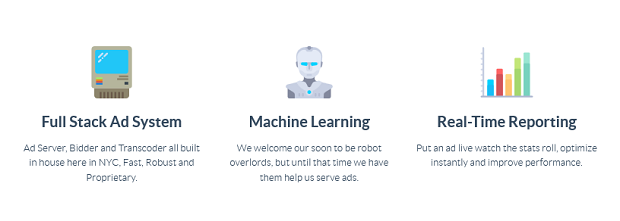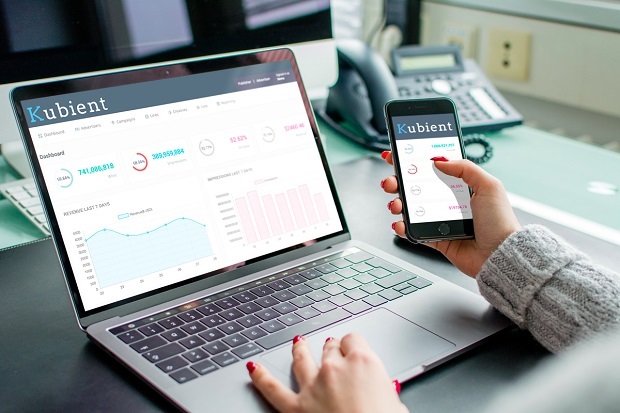Kubient is a technology company based in New York City that is adding trust and transparency to programmatic advertising using some new concepts around how to stop fraud in the ecosystem with machine learning. Their team has developed a technology solution that will allow advertisers and their tech partners the ability to use machine learning analysis before they bid on a potential advertising opportunity. To learn more about the Kubient, see our interview with Paul Roberts below:

Q: Could you tell us something more about your partners?
A: Our partners include major companies in the space: Comcast/Freewheel, Yahoo/Brightroll, AOL/Adaptv, Smaato, Teads.tv, and many others. In 2017, bot fraud alone accounted for around $6.5 billion dollars in fraud. This is a very big problem to solve because programmatic advertising in only growing larger each year, but advertisers are starting to lose trust in the current “status quo” system that cannot stop fraud.
Q: Tell us more about your tech stack?
A: Our stack resembles others in the industry that it includes a real-time bidder, ad server and video ad unit. The major difference is our speed. For example, our bidder is written in Erlang, which is perfectly suited for the massive scale of programmatic while executing the auction process lightning quick.
This built-in speed allows us to take a step back and assess how we can try to address fraud using machine learning analysis before the advertiser actually ever bids on a potential impression. It was a VERY long 16 months as we tried to come up with this solution. Recently, we finally cracked the code that can analyze every single advertising opportunity during the initial programmatic auction and return a definitive response in under 9 milliseconds.
 Recommended: GearLaunch Provides Merchants With The Tools To Compete In An Environment Of Escalating Consumer Expectations
Recommended: GearLaunch Provides Merchants With The Tools To Compete In An Environment Of Escalating Consumer Expectations
Q: What is your overall opinion on the solutions to prevent fraud now?
A: I have a tremendous amount of respect and applaud anyone making an attempt to clean up the industry. From day one, we felt the ad fraud is a problem that can be better tackled with better technology and we could move the needle from fraud identification to actual fraud prevention.
One big challenge is the limitations of certain languages and technology being employed to “identify fraud”. Programmatic advertising is an industry that operates in milliseconds and microseconds. Certain languages, by their design, are not made to perform in an environment where a millisecond can make the difference between success and failure.
After completing the build on our core stack, we realized we could add some features in the bid stream and true machine learning to prevent fraud was at the top of that list. We immediately seized on this idea because it would be a radical departure from the current solutions in the market that offer post impression machine learning to analyze for fraud. Our team was told over and over that the top machine learning teams in the world could only get a response in 180 milliseconds which would have been to slow. This forced us to look at the problem from a different angle and create something that no one has done to achieve the sub 10-millisecond response.
I had to continually remind myself of Roger Bannister and the fact that everyone told him the four-minute mile is humanly impossible. My team really deserves the kudos as they have built something people said was impossible and that is the type of development that radically changes an industry.
 Recommended: The Bullcoin Foundation Plans To Get A Crypto Hedge Fund License To Further Boost Investor Confidence
Recommended: The Bullcoin Foundation Plans To Get A Crypto Hedge Fund License To Further Boost Investor Confidence
Q: Blockchain is the big buzzword, how does it fit into preventing ad fraud?
A: I think blockchain will be able to introduce some very much needed transparency to the programmatic space. That in itself will reduce some of the fraud, but blockchain is not built for speed so it cannot be used during the critical point of the programmatic auction where an advertiser has milliseconds to decide if it is a human or a bot on the other end of the auction. I have sat on the sideline and watched a few new companies make some interesting claims how blockchain will solve all of the industry issues, but time will tell.
Q: What are your plans for the future of Kubient?
A: We are actively raising money to scale our engineering and sales team. In our current model, we sit in between large exchanges and we plan to quickly move to more direct relationships with direct advertisers and publishers. We have identified some challenger brands that have expressed interest in joining our beta testing. The advertisers are excited to not just identifying ad fraud, but not even bidding on it in the first place.
Preventing fraud will be a never ending game of cat and mouse, but we think being able to use machine learning before an advertiser bids on an ad opportunity will be a tremendous step in preventing the staggering amount of fraud in the industry.
Activate Social Media:


